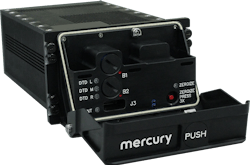Mercury to build data recorders and encryption avionics for F/A-18C/F carrier-based jet fighter-bombers
PATUXENT RIVER NAS, Md. – U.S. Navy combat aircraft avionics experts needed advanced data recorders for F/A-18C/F carrier-based jet fighter-bombers. They found their solution from Mercury Mission Systems LLC in Torrance, Calif.
Officials of the Naval Air Systems Command at Patuxent River Naval Air Station, Md., have announced an $18.4 million order to Mercury for data transfer units and avionics data recorders, as part of the Automatic Real-Time, Reconfigurable Interface Generalization Hardware Multiprotocol Data Recorder project.
Mercury Mission Systems (formerly Physical Optics Corp.) will provide 35 data transfer units, 15 secret serial advanced technology attachment encryption module cables, 157 high-definition video recorders (HDVR), and 72 HDVR data transfer devices for retrofit on F/A-18C-F aircraft.
This order is a modification to a $35.7 million contract awarded to Mercury last fall for 104 1553 data-transfer units -- 68 for retrofit on F/A-18C-F aircraft and 36 for EA-18G production aircraft; and 144 high-definition video recorders for the F/A-18C-F aircraft.
Mercury predecessor Physical Optics developed a new Automatic Real-Time, Reconfigurable interface Generalization Hardware (ARRGH) multiprotocol data recorder and data storage system as part of the Automatic Real-Time, Reconfigurable Interface Generalization Hardware Multiprotocol Data Recorder project. Mercury acquired Physical Optics in late 2020.
The phase-one ARRGH design is based on innovative integration of hybrid transcoding hardware, RAID-based mass storage, and intelligent transcoding heuristic software, Navy officials say.
This 40-Watt, 11-pound design offers seamless on-the-fly rerouting and data translation of input signals to and from the data recorder irrespective of interfaces involved.
A plug-and-play self-sealing environmentally protected removable memory unit (RMU) enables rapid upgrades to avert obsolescence by capitalizing on commercial solid-state memories.
The prototype includes shell adapters to ensure form-factor compliance with a variety of current data recorders, including the RM-6000f on F/A-18.
The ARRGH provides 1 terabyte of removable memory, sustained write speeds of 550 megabits per second (2700 megabits per second burst) and has a built-in self-test.
The second phase of the ARRGH project produced a fully functional ground-tested prototype and a flight-test-ready prototype, as well as defined a platform integration roadmap, got started on device certification.
On this order Mercury will do the work in Torrance, Calif., and should be finished by March 2025. For more information contact Mercury Mission Systems online at www.mrcy.com/products/data-storage-and-transfer, or Naval Air Systems Command at www.navair.navy.mil.
